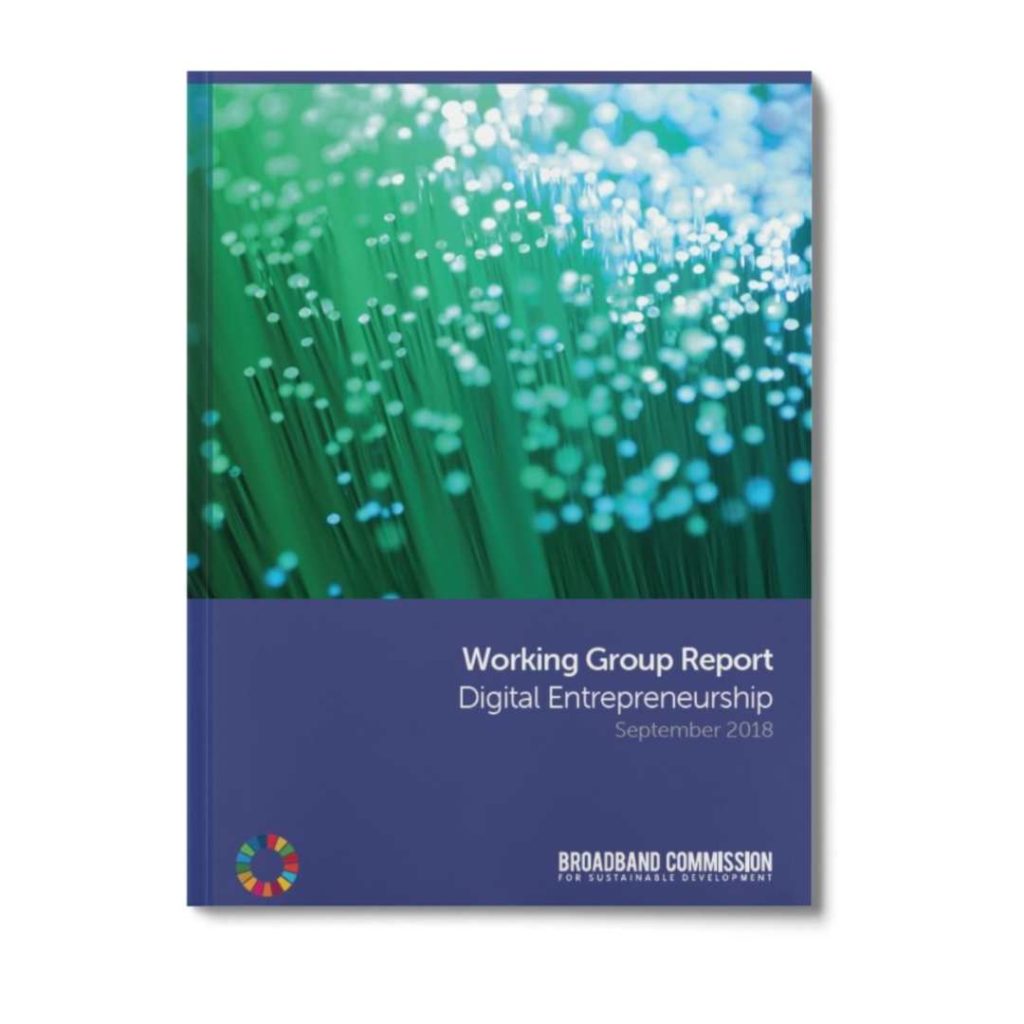How can digital entrepreneurship impact developing countries?
Chaired by Mr. Andrus Ansip, Vice President of the European Commission, the Broadband Commission for Sustainable Development’s 2018 Working Group on Digital Entrepreneurship examined the potential of digital entrepreneurship to dramatically improve lives in developing countries, and to help those countries make progress on the United Nations Sustainable Development Goals. The Working Group’s 2018 report produced actionable policy recommendations for all parties involved in promoting digital entrepreneurship – governments, businesses, civil society and donor organisations — and worked to set digital entrepreneurship as a priority for developing countries.
Setting the Stage
What is digital entrepreneurship and how can we leverage it in the developing world?
The 2018 Working Group used the term “digital entrepreneurship” to refer to several, interrelated phenomena. Micro-, small- and medium-sized enterprises (MSMEs) sit at the core of this vision – along with startups, whose lack of legacy and vivid imaginations often make them highly effective innovators. But they’re not the only ones; many already successful companies are also changing their way of doing business, looking to develop more and better services based on the dramatic leaps that digital technology can provide.
Digital entrepreneurship – despite some isolated success stories – is having trouble making inroads in the developing world, as in many parts of the developed world. Left unaddressed, this gap could reinforce the lower contribution that small companies make to gross domestic product in developing countries and prevent the development of small companies from turning into big ones.
The Way Forward
Conclusions and Recommendations
The Working Group 2018 Report titled Digital Entrepreneurship calls on all actors – governments, businesses, civil society, donor organizations, citizens and more – to embrace digital entrepreneurship and make it a crucial lever for reaching the SDGs, proposing action in the areas of management, policy, incentives and regional & global cooperation.
In addition to the Working Group’s 2018 Report, which produced policy recommendations and examined the potential of digital entrepreneurship, the Working Group on Digital Entrepreneurship also established a roadmap as an action plan for digital entrepreneurship. This Roadmap consists of a nine-point action plan which includes several targets and recommendations to help realize the Broadband Commission for Sustainable Development’s ambitious development targets for “connecting the other half” by 2025.
The report sets a nine-point action plan and puts forward several recommendations to foster digital entrepreneurship:
- Connect
- Skill up
- Build a supportive policy environment for digital development
- Deliver equal opportunities
- Make the administrative transations of running a business fully digital
- Adopt and propogate electronic identities and signatures
- Fund knowledge and innovation
- Harmonize cross-country rules for healthy, high-volume regional trading relationships
- Develop Digitally
- For developing countries in particular, it is essential – and urgent – to promote digital entrepreneurship, to build and scale new businesses based on the technologies of the fourth industrial revolution.
The Working Group Model
Composition and Activities

Mr. Andrus Ansip
Vice President, European Commission
- AU Commissioner
- Bharti enterprises
- VEON
- ITC
- GMSA
- America Mobil
- Republic of Rwanda
- IMDA, Singapore
- Kenyatta University
- Inmarsat
- Nokia
- Huawei Technologies
- ITU
- CITC Saudi Arabia
- Intelsat
- Pakistan
- UN-OHRLLS
- UNESCO
- UN Foundation
- OECD
- UNCTAD
- Intel
- ITSO
- World Bank
The Working Group timeline:
– Confirmation of the 5 themes to be assessed: legal and regulatory frameworks, cross border barriers, physical environment, labor and financial markets and possible modifications
– Selection of the most relevant issues to be addressed per theme
– Analysis of existing evidence, literature and proposals to address the issues under each theme, including work of the previous Working Groups of the Broadband Commission
– Drafting of preliminary recommendation before the spring meeting. Monthly/Bimonthly VCs
– Working Group meeting at the Broadband Commission Annual Spring 2018 meeting
– Contribution to the 2018 Annual report of the Broadband Commission
– Final endorsement of the recommendations and the launch of the assessment report
– The Working Group concluded its activities during the Annual Meeting of the Broadband Commission in New York, on 23rd September
Focus Area
Outcome Resources
Chair
Mr. Andrus Ansip
Vice President of the European Commission
Broadband Advocacy Targets
SDGs







